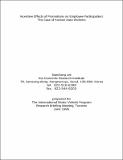Incentive Effects of Promotions on Employee Participation: The Case of Korean Auto Workers
Author(s)
Lee, Daechang
Downloadlee-dae.pdf (54.79Kb)
Metadata
Show full item recordAbstract
In the tournament games only the winner can advance to the next rounds
of competition. The important feature of tournament is that the reward is
based on the rank order among competitors rather than absolute level of
their performances. This type of reward system can be widely found in
competition for promotion in business organizations. For example, many
hourly workers in manufacturing plants compete for a limited number of
supervisory positions; a number of vice presidents in a firm strive for one
coveted position of president.
The employee participation in improvement activities have been thought
of as one of the best practices taken in many auto plants around the world.
So we can find auto firms often evaluating their workers on the basis of
how good performances they show in off-line activities such as suggestions
and QC circles. Or at least it is one of many evaluating items. Since the
opportunity of promotions is limited but often known to production
workers in advance, it may be regarded as prizes open to candidates.
Tournament theory shows that compensation based on relative order can
give participants an incentive to provide an optimal level of efforts under
certain a set of assumptions. It is often argued that the optimal level of
efforts depend positively on the price differential for winning the game.
There has been many studies to analyze the benefits and costs that
employee participation activities can give individual workers [Cooke
(1990)]. However, few attempts have been made to test if promotion
tournaments can induce workers to involve more actively in employee
participation. In this study I seek to test the incentive effects of
promotion using data from a survey of Korean auto plants.
Date issued
1995-06Keywords
Korea, auto plants, manufacturing, incentive, promotion, employee participation